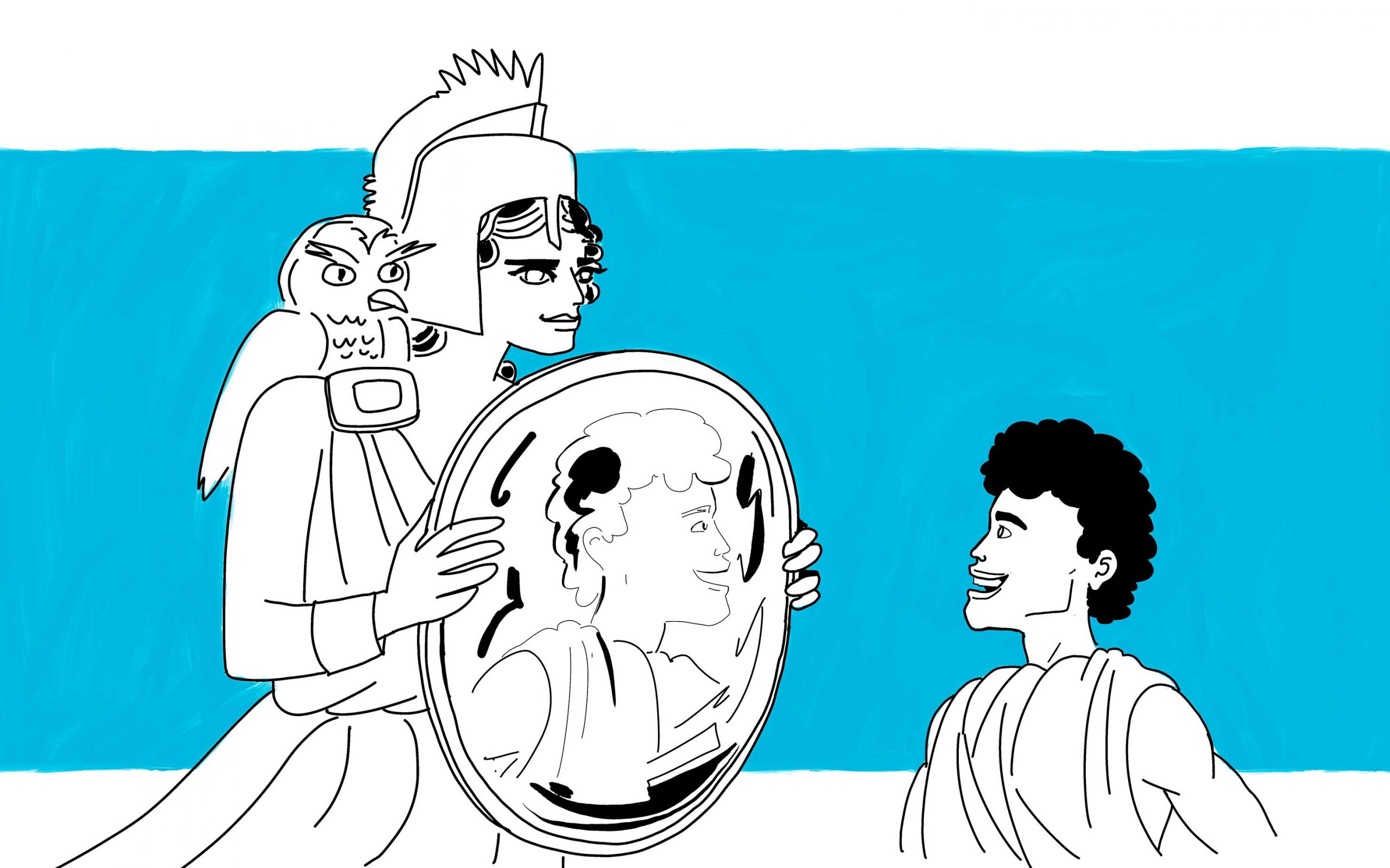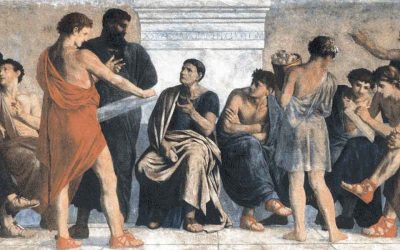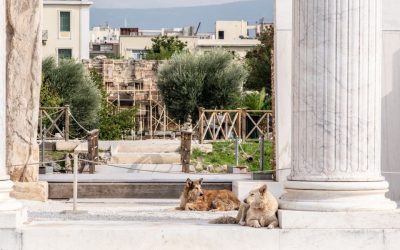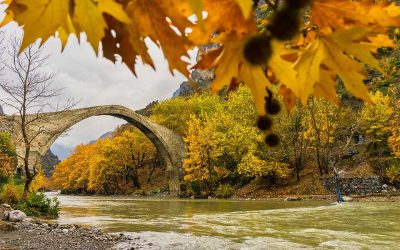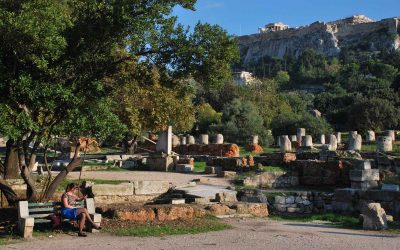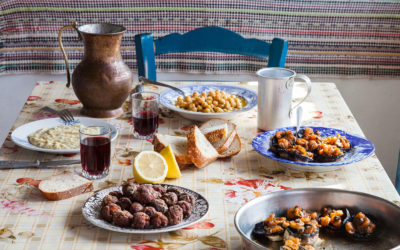The writer Alexie Basil talks about the new podcast series for kids from the Onassis Foundation that makes Greek mythology come alive.
Fourteen-year-old Perseus is in a pickle. With the naïve bravery typical for a teenager, he has promised to slay the gorgon Medusa for King Polydectes. Luckily, he’s about to receive unexpected help. His father, he finds out, is Zeus, and his siblings Hermes and Athena are quick to come to his aid.
In the new podcast series “Live from Mount Olympus,” a production by the Onassis Foundation and the Brooklyn-based theater ensemble The TEAM, the ancient Greek myth of Perseus and Medusa comes to life in a modern and humorous interpretation for pre-teens.
Acting as the narrator of the podcast, or the “Gods’ pod”, as he calls it, is Hermes, voiced by Tony Award-winning actor André De Shields, who also played the messenger of the gods in Hadestown at the West End and on Broadway.
A pompous and dramatic character, his voice is contrasted by that of Perseus, voiced by Divine Garland, who speaks like kids do today, with all the sighs and “OMG’s” that come with it.
The result is colorful exchanges that are often as entertaining for adults as for the intended audience: “I bestow upon thee my Adamantine sword – strong enough to cut any substance known to man or god.” “Woah, thanks big bro! …Why is it curved?” “What were you expecting? A lightsaber?”
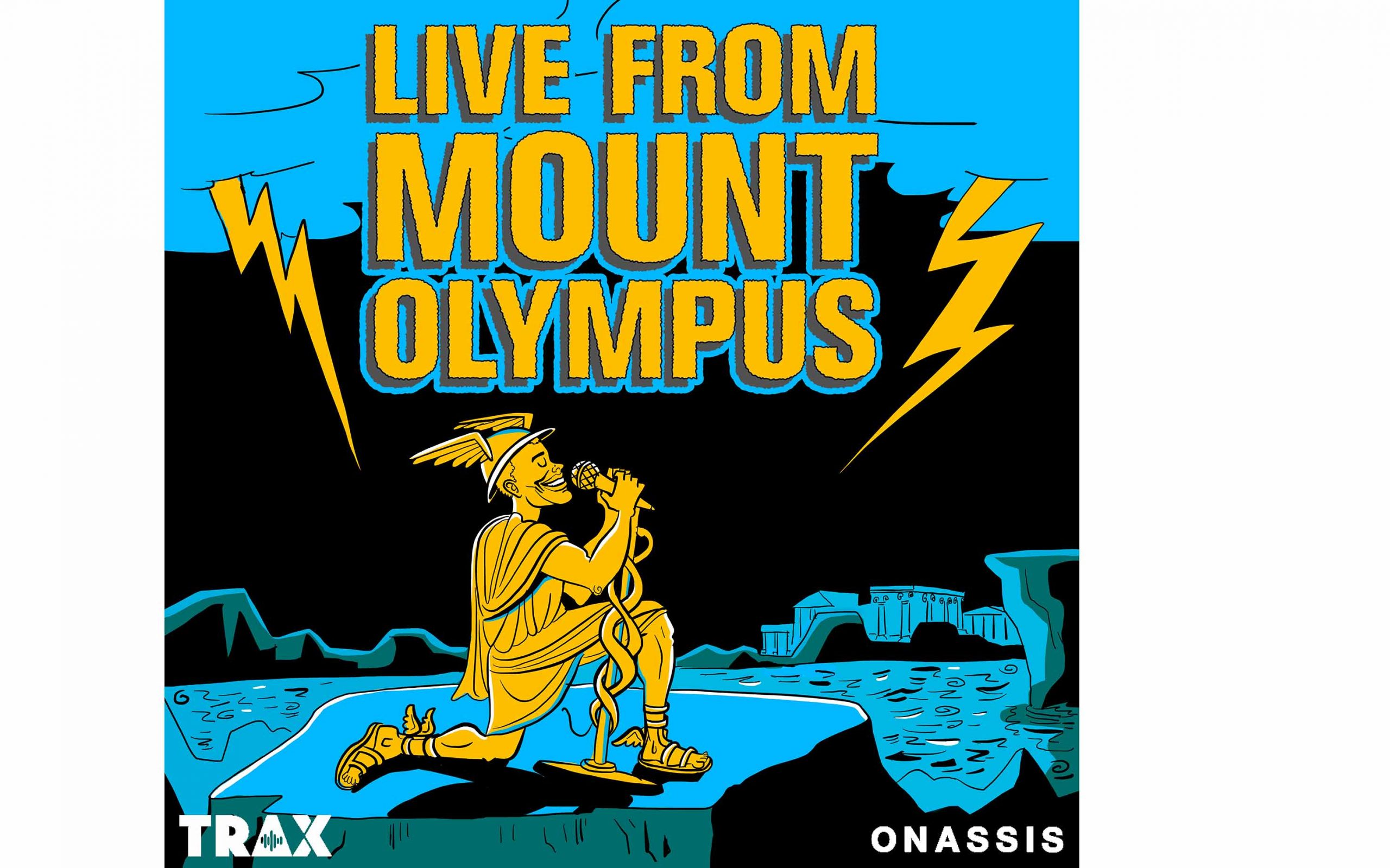
Jason Adam Katzenstein created the illustrations for "Live from Mount Olympus".
© Jason Adam Katzenstein
“That was a big decision we had to make early on—what do the characters sound like?” head writer Alexie Basil recalls. “Is their dialogue modern or classical? Do they use Greek expressions or have any kind of accent? Ultimately, we decided to stay grounded in contemporary language and vary the affectedness based on the characters and what the individual actors brought to the table. Perseus speaks like a passionate, energetic present-day teenager, while Hermes’ dialogue is more lyrical and timeless.”
Basil, a graduate of the Tisch School of the Arts, is a screenwriter and teacher based in Brooklyn. She was brought on by co-creator and producer Julie Burstein to define what the podcast was going to be about, map out the first season, and write it.
It seems it was the perfect fit: “I’m really drawn to coming of age stories that are elevated in some way – either by adding one outrageous detail or setting it in a larger-than-life situation or building it from Greek mythology or something like that,” she explains.
What made you want to write for kids and young adults?
When I was a kid, it felt like most media about kids/for kids was cotton candy clouds and rainbows. Don’t get me wrong, I love Disney, but I couldn’t relate to the families and situations I saw. Things went wrong, then were resolved in a way I couldn’t understand.
I was still able to enjoy the content, but an unintended side effect was that I thought it all was a fantasy – the messages and themes included. I could see how Lizzie McGuire or whoever deserved love and respect, but it never registered that I, in my much more complicated and messy circumstances, deserved those things too.
I want to tell stories for kids and young adults that lean into messy – stories that don’t make “complicated” feel shameful because it’s never on screen. This obviously gets into the much broader problem of representation in media, too. Everybody deserves to see themselves reflected in the media they watch, and to see people they relate to triumph.
The actors did a great job voicing the characters which are at once so “normal,” in that they speak like modern day people, while at the same time facing the supernatural and sometimes absurd realities of the Greek myths. Did you talk to any of the actors about the story beforehand?
I was fortunate to get to attend some of the earliest rehearsals via Zoom. We started rehearsals with just two episodes written – it was sort of unconventional in that we wouldn’t lock the episodes until the last possible minute, which allowed us to incorporate feedback from the actors and directors and shape the material based on their interpretations. So when an actor read a line in a really funny or unique way that we hadn’t considered before, we could lean into it and draw out the humor.
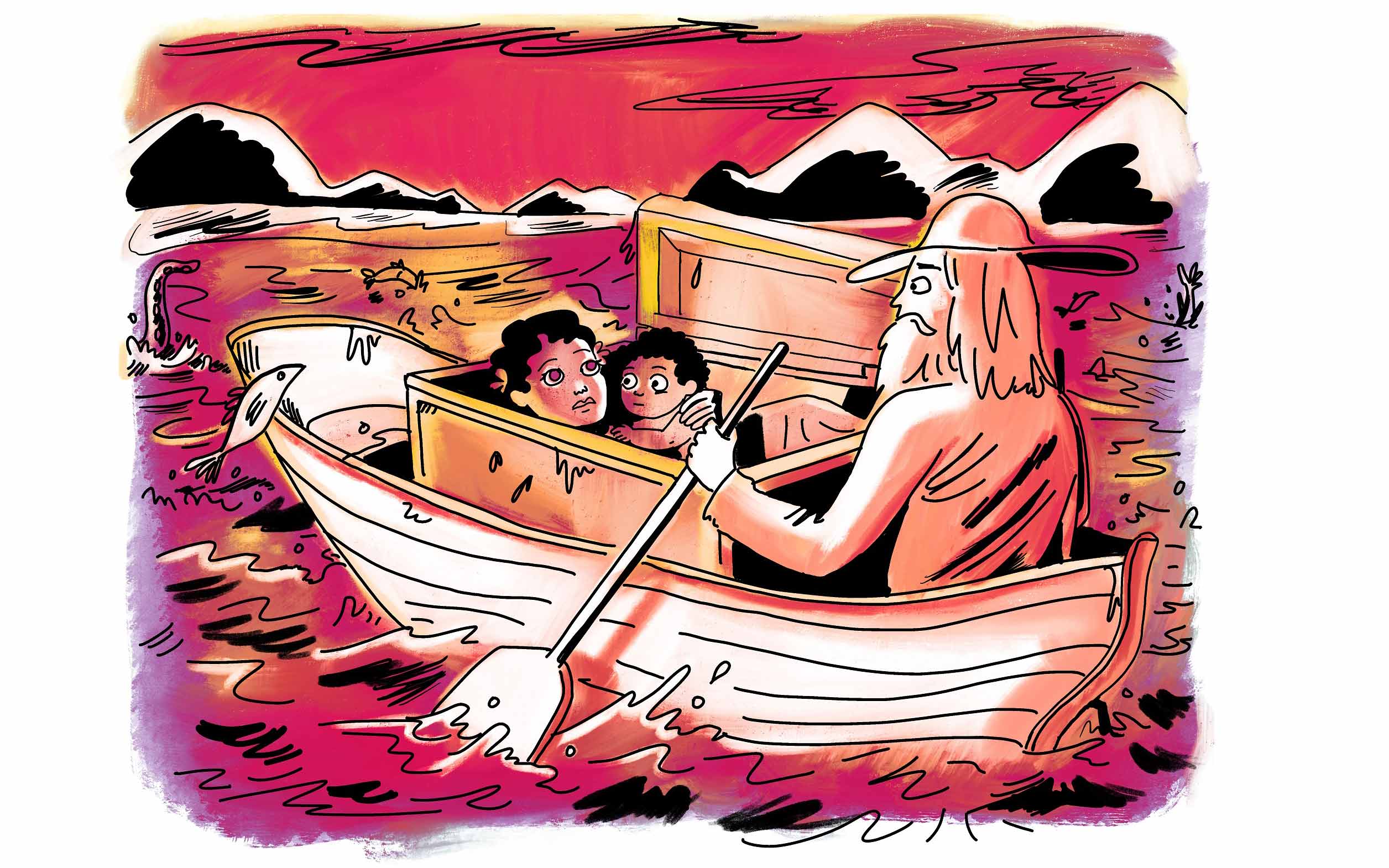
Jason Adam Katzenstein created the illustrations for "Live from Mount Olympus".
© Jason Adam Katzenstein
What was your reaction to learn that André De Shields, who also played Hermes in Hadestown, would be the one voicing your Hermes in Live from Mount Olympus?
I was thrilled! I honestly never anticipated something like that happening. During the earliest stages of pre-production, we had no idea what to expect in terms of casting. I was writing Hermes’ voice based on an imaginary character I had in my head.
Once André was cast, the whole character came to life in a completely new way. André adds a sophistication and wit to every one of his characters, and it was really incredible to get to play with that here.
In my mind’s eye, I saw the story play out as an animation. How do you like to picture the young Perseus’ world?
I was definitely imagining it animated. If you want to stick to the myths – which was important to us – then you can’t have your imagination constrained by what would look good on film. So many things happen that wouldn’t translate. For example, when Perseus chops off Medusa’s head, she births Pegasus and the giant Chrysaor from her neck.
When you hear that in a myth, you just kinda roll with it. But once you start trying to imagine, “Okay, what does that look like in real-life?”, you run into challenges with the practicality of it. Like, is this super gross and gruesome? Or are we somehow playing it off as magical and clean? They emerge fully grown – how do they fit out of her neck?!
Animation gives you permission to stretch reality more than usual. And beyond that, with an audio drama, you preserve some of the ambiguity and metaphor from the original myth. We don’t have to lock down what it looks like, just what it sounds like, so listeners suspend their disbelief more readily and let their own imaginations fill the gaps.
Greek mythology isn’t necessarily a subject that will pique the interest of young adults on a curriculum, but when you think about the stories, they are full of action, fantasy and romance. What do you want teenagers to take away from this?
A cool thing about myths is that they aren’t morals. Most popular stories today – especially ones for kids and young adults – come with lessons attached. Sometimes it’s heavy-handed and sometimes it’s subtle, but there’s almost always morality ascribed to it.
The thing that drew me to this project most was the commitment to not jam an ancient mythology peg into modern morality hole. Myths aren’t black and white, they’re gray. Perseus makes big mistakes. In many ways, Medusa is a victim of Perseus’ bravado. The gods have the power to resolve situations with a snap of the fingers, but they don’t. Why not?
My biggest goal while plotting out the season’s arc was to let Perseus be a flawed hero and allow listeners to grapple with that mostly on their own. Of course, other characters react to Perseus’s choices, but ultimately, it’s up to the reader to decide if the ends justify the means and if Perseus is redeemable.
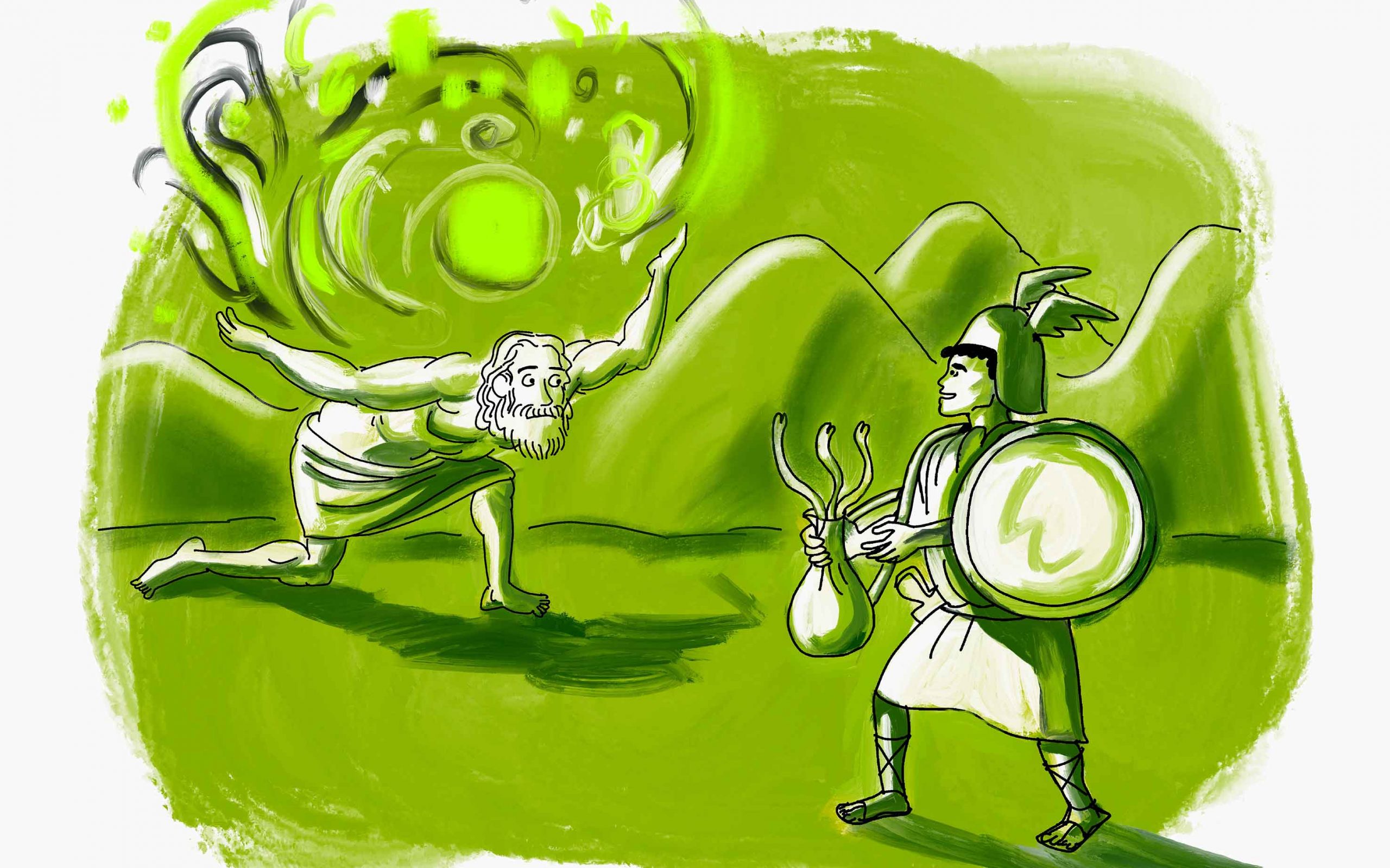
Jason Adam Katzenstein created the illustrations for Live from Mount Olympus.
© Jason Adam Katzenstein
As an older listener who’s often around teenagers, there were several amazing moments that made me laugh out loud, like whenever Perseus exclaims “Oh my gods!”. It felt like a wink to those of us who hear a few too many OMGs (Greek teens do a greekified “Oh-me-gee”) per day. Was it important to you that older people also enjoy the writing?
I’m so happy to hear it made you laugh! When we were imagining the ideal listening environment for this podcast, we were picturing teachers playing it aloud in their (now virtual) classroom or kids listening to it with their adults in the car.
We wanted it to have a broad enough appeal that kids and adults would look forward to it together, which is when you really get those great conversations. So, a lot of the humor and jokes are targeted toward older listeners. Marty McFly gets a mention!
I also loved Hermes’ role as the narrator who also enters the story, and then breaks the fourth wall telling Perseus “I need to check on my subscribers. It’s a ‘Gods’ pod’ thing”. Ancient myths are merging with very contemporary storytelling techniques here. What were your initial thoughts about telling ancient myths to teenagers in a podcast format?
When I first came on to the project, the task was “a podcast about Greek myths for pre-teens.” That was it. There wasn’t a central story or character or format or anything. We really could’ve gone any way with it.
Something that mattered to me from the beginning was making use of the medium. If we were doing myths as a podcast, then why must this telling be a podcast? I wanted it to be motivated from within the story instead of just something tacked on afterward. Since Hermes is the messenger of the gods (and a bit of a trickster), it was a natural fit. What if Hermes wanted to share Greek myths more broadly with us mere mortals? A podcast wasn’t much of a stretch. And so we ran with it.
Do you have a favorite among the Greek Gods?
Athena is a boss. Wisdom and warfare are one heck of a combo.
Where else can we see, or read, or hear your work?
I teach screenwriting with my mentor and old NYU professor, John Warren. We created Young Screenwriters, which is an online community and resource for up-and-coming screenwriters all over the world. Our whole mission is making the craft of screenwriting accessible to more people—basically, help them finish their first screenplay.
So far we have more than 25,000 students in 170 countries. We break down a movie live on YouTube every Friday, if you ever want to come by!
Info
Live from Mount Olympus is directed by Tony Award-winner Rachel Chavkin and Zhailon Levingston, and created by Peabody Award-winning producer Julie Burstein. Karen Brooks Hopkins is the executive producer.
New episodes are released every Tuesday through March 9, and are available for free on Spotify, Apple Podcasts, Amazon Music, and here.

